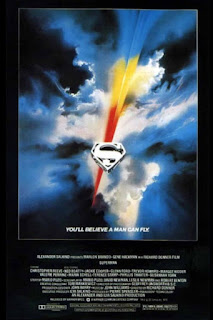"You'll believe a man can fly."
That was the tag line of the 1978 Superman movie. It actually held multiple meanings that I think are largely lost on audiences who didn't see it at the time. The practical meaning referred to the special effects. One of the reasons that there were no "serious" comic book movies prior to Superman is because of the limitations of technology showing a person flying. You'd have Kirk Alyn leaping off a trampoline and a paper mâché dummy on wires dressed up to look like Tom Tyler and George Reeves laying on a platform in front of a rear screen projector. It all worked well enough to get the point across to audiences, but there was definitely some suspension of disbelief required on their part. With Superman, the technology had advanced enough that your average viewer could just take the character's flight as real. They didn't have to ignore the hallmarks of special effects trickery because they simply weren't there. "You'll believe a man can fly" meant that viewers were going to see a special effects marvel they had never seen before.
The other angle to the tag line, though, was a more emotive one. The 1970s were a pretty dark decade for the United States. The US entered the '70s already embroiled in the Vietnam War, which had already proved very costly in terms of both lives and money, and the public were very tired of it. The office of the Presidency was dragged through the mud thanks to Richard Nixon and the Watergate scandal, causing people to question the federal government en masse. There was a massive, near-global recession from 1973-1975 combined with heightened inflation, hitting everyone with both rising prices and falling income simultaneously. The unemployment rate almost doubled between 1969 and 1970, and it remained that way for the entire decade. Not to mention all the harder-to-define social problems that were getting worse -- you couldn't see city skylines for all the smog and pollution, which also covered the surfaces of everything with an ugly grit and grime. All of this, to no surprise, generated a lot of cynicism and left a lot of people feeling dejected and hopeless. But in telling them, "you'll believe a man can fly," Superman was saying that there was still something magical and bright to believe in. That there was still hope, something that was in very short supply by that point.
Because that's a lot of what Superman is about, right? He brings light and hope to people. He's a magical, nearly all-powerful being -- a mortal -- who just wants things to be better for people, and he has both the ability and the will to do what's right because it's what's right. Superman's first line as a public hero in the movie is, "Easy, miss. I've got you." And that's his entire character. "Don't worry. I'll take care of everything for you." That is what everyone in the country wanted -- needed -- to hear in 1978. They'd spent a decade or more struggling with every aspect of life, and they wanted someone they could believe in to tell them that everything was going to be okay.
In 1978, Superman set box office records.
Here's the thing. Superman is, when he's done correctly, about hope. It's right there in Jor-El's speech from the movie: "They can be a great people, Kal-El. They wish to be. They only lack the light to show the way."
And that's what made Superman popular in the first place back in 1938. The US had been in The Great Depression for nearly a decade by then. Companies were laying off employees right and left.
A tariff war made things worse. So when Superman came in to start taking care of things -- proving framed people's innocence, capturing mobsters, exposing corrupt politicians... -- readers lapped it up. The character proved popular enough to warrant a newspaper comic strip within the first year, a second comic book a few months after that, a radio show the year after that, animated theatrical shorts and a third comic book the year after that... Audiences were desperate for a hero to save them, even if he were entirely fictional. But he offered hope in a way they hadn't had for years.
Now, while Superman has been around pretty continuously since 1938, his popularity has obviously waxed and waned. Some of that has to do, of course, with the quality of storytellers that are telling his exploits. But I think it's noteworthy that the character's broad popularity closely follows (in reverse) the mood of the nation. When things are going well, he's set to the side because he's not needed. People already have hope and don't need his light. It's primarily when that hope fades and people's own light no longer shines very brightly that they turn back to Superman. He becomes the beacon people need when they can no longer see a light at the end of the tunnel. It's not uncommon to compare Superman to Jesus, and I think this is certainly part of that since people look to religion in much the same way.
I haven't seen the new Superman movie that debuted earlier this month, but from all the accounts I've heard, it is done well in many of the same ways that 1978 film was. Some of that, to give credit where it's due, is because of writer/director James Gunn. But I think a large part of that, too, comes from nearly a decade of darkness the US has been enveloped in with people no longer seeing a way out. Unfortunately, that's no guarantee the fictional Superman will lead us out of the real world disassters we're facing, but it totally makes sense why people are clamoring for a good Superman movie right now.
Superman: Only Successful in the Dark?
By Sean Kleefeld | Friday, July 18, 2025
Leave a Comment







0 comments:
Post a Comment